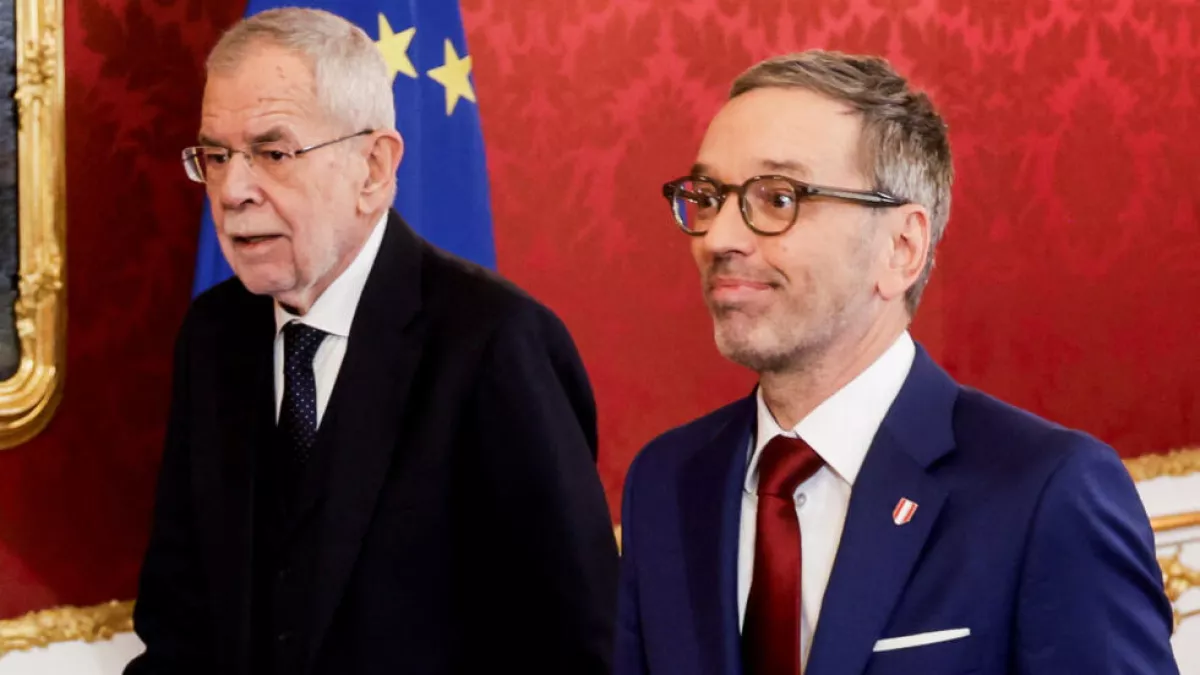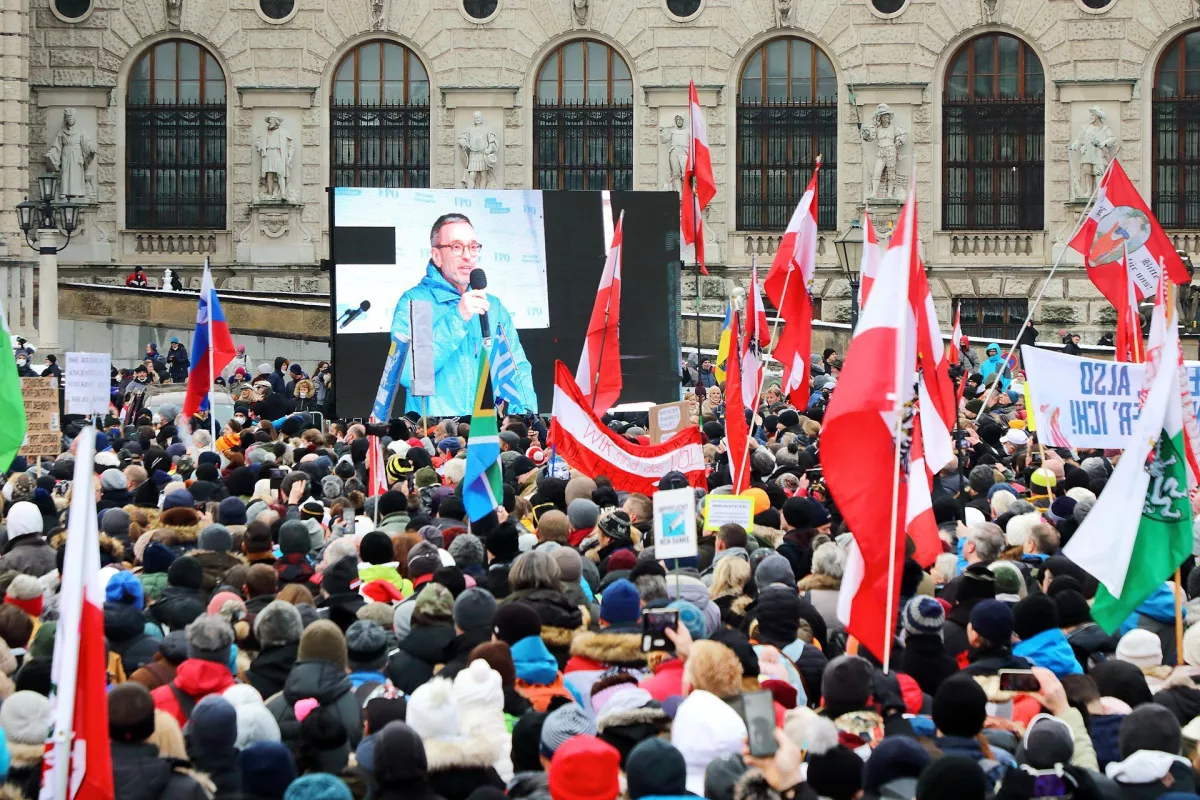Austria shifts to the right as the Freedom Party grows in popularity Brussels has a new cause for concern
A new cause for concern has emerged in Brussels, Berlin, Paris, and other EU capitals. By January 2025, the popularity of the Freedom Party of Austria (FPÖ) has risen to 36-40%, increasing the likelihood of ultra-right forces coming to power in yet another European country.
The first warning sign came in September 2024, when in the Austrian National Council elections, the FPÖ secured 29% of the vote, surpassing the traditional favourites — the Austrian People's Party with 26% and the Social Democratic Party of Austria with 23%. All attempts to create a bloc against the FPÖ ended in failure, making its leader, Herbert Kickl, a likely candidate for the next Austrian chancellor. This is especially true since Austrian President Alexander Van der Bellen has tasked Herbert Kickl with forming the country's government.

The coalition opposing the Freedom Party collapsed in early January when the Liberal Forum (NEOS) withdrew from tripartite government negotiations with the People's Party and the Social Democrats. The reason for this step lies in the refusal of the partners to implement the tough and unpopular economic reforms proposed by the liberals: raising the pension age to 67, freezing pensions in the public sector, and abandoning pension indexation based on inflation, among others.
As the leader of the Liberal Forum, Beate Meinl-Reisinger, said: "This is a difficult time, and we must clearly formulate the question: 'What can we do?' Austria has been experiencing a deep economic crisis for the third year in a row. Companies are forced to lay off employees. The situation is more than unstable: Ukraine, Syria, Russia, Trump's presidency. The situation is far from normal. But the Austrian People's Party and the Social Democratic Party of Austria are not ready to take on 'bold projects,' they are merely exchanging interests."
Observers note that the failure of coalition negotiations in Austria is part of a series of government crises that followed Donald Trump's victory in the U.S. presidential election on November 5 of the previous year. The next day, November 6, the coalition in Germany collapsed; on December 4, the Barnier government in France fell; on December 6, the results of the presidential election in Romania were annulled; and on January 6, after several months of political turmoil, the government of Canadian Prime Minister Justin Trudeau resigned.
These trends can be explained by the collapse of the global left-liberal agenda promoted by former U.S. President Joe Biden and the European Commission. The slogans of "defending liberal democracy," "climate agendas," "multilateral relations," and "protecting minority rights" have collided with harsh political and economic realities. As a result, ruling elites in most countries are shifting from globalization to protectionism. In this environment, the far-right is emerging as a beneficiary, positioning itself as "outsider" politicians defending the interests of ordinary citizens.
Austria has been a focal point for the economic and political contradictions of recent years. As one publication noted: "Austria's schizophrenia between political integration in the West and the strong profit interests of red-white-red financial capital in the East makes Austria a geopolitical ‘tipping candidate’."
The European "green course" has never been well-received by Austrian businesses. Historically, the country’s industry has been geared toward fossil fuels. Former Austrian Chancellor Karl Nehammer openly opposed the EU's plans to ban internal combustion engines. Austrian industrialists also expressed dissatisfaction with EU laws related to carbon emissions taxes and environmental protection.
Austria’s leading bank, Raiffeisenbank International, found itself in a precarious position after the war in the East began. Fifty percent of its profits were generated in Russia, which, on one hand, made it a target for threats from the U.S., and on the other, subjected it to pressure from Russia.
On January 1, 2025, the last cubic meters of Russian gas crossed the Austrian border. The country's decision to discontinue its reliance on this energy source, which had been vital for its economy for six decades, marked the end of an era. Until the very last moment, Russian gas accounted for 22% of Austria’s total electricity needs.
In this context, the Freedom Party of Austria became the ideal advocate for the country’s large businesses. With its campaign slogans, it focused on tightening immigration policies, including the "repatriation of undesirable foreigners"; a return to traditional Austrian neutrality; and withdrawal from all EU military initiatives, including the missile defence system. A populist move by the far-right is their call for direct democracy, with the Freedom Party supporting the introduction of referenda on initiatives backed by more than 250,000 citizens.

Following this, the leader of the Freedom Party, Herbert Kickl, began forming a government. He held talks with the leadership of the People's Party, which expressed its willingness to enter into a coalition with the far-right, provided that the latter would strictly adhere to the principles of "Western rule of law," the ideology of liberal democracy, a strong EU, opposition to Russia, and media freedom. In other words, once the government was formed, Austria's far-right would need to stay in line with the European mainstream, just as their Italian counterparts have already done.
On the other hand, reaching an agreement on budget cuts, a priority for both centre-right and far-right factions, proved to be much simpler. In just three days, the Freedom Party and the People's Party reached a preliminary agreement on reducing the budget deficit, which stands at 3.4%, just above the EU's 3% limit.
The planned measures include reducing expenses by €6.3 billion, of which €3.18 billion will come from subsidies, €950 million from tax reforms, and €240 million from optimizing administrative costs. Ultimately, the coalition aims to reduce the deficit to 2.9% of GDP as part of a 7-year "financial consolidation" program.
There is also speculation that if Herbert Kickl becomes Chancellor, he will seek to create a regional political and economic bloc that could include Hungary and Slovakia. In this alliance, Austria would be the regional hegemon, enabling it to more effectively defend its interests not only before Brussels but perhaps even Washington.
The successes of Austria's isolationists have understandably caused dissatisfaction in European corridors of power, and it is possible that Brussels will take economic pressure measures. In 2024 alone, Austria received €4.1 billion from EU funds, making it highly vulnerable to financial blackmail.
The leader of the Christian Social Union in Bavaria (CSU), Markus Söder, described the election results in Austria as "concerning" for Germany. He emphasized the need for centrist consolidation. German Vice Chancellor Robert Habeck from the Green Party called the situation "a bitter lesson for moderate forces" who have failed to reach agreements with each other.
Meanwhile, the co-chair of the Alternative for Germany (AfD) party, Alice Weidel, viewed the success of the Austrian Freedom Party as confirmation of the potential of the AfD's chosen strategy. She called on the German Christian Democratic Union (CDU) to reconsider its refusal to cooperate with her party, citing the example of their Austrian counterparts, especially since, in her view, Germany is also heading for changes in the near future.








